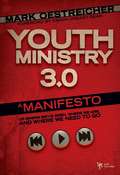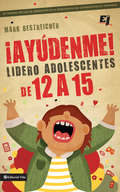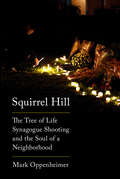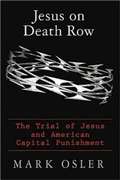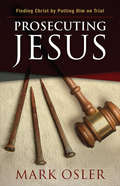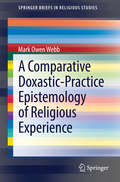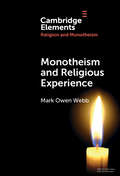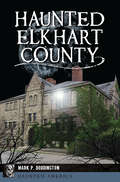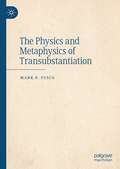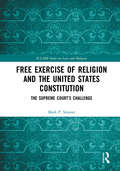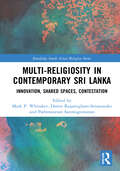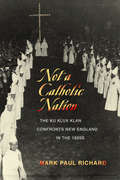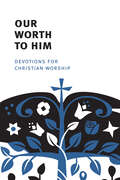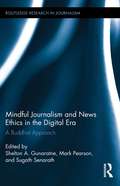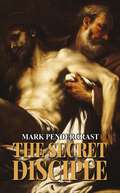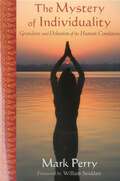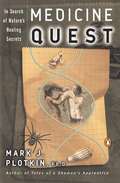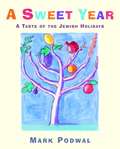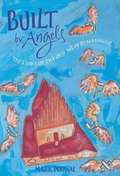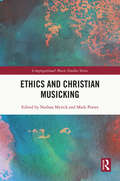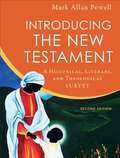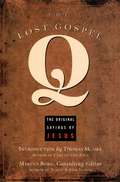- Table View
- List View
Youth Ministry 3.0: A Manifesto of Where We’ve Been, Where We Are and Where We Need to Go
by Mark OestreicherOver the past several decades there have been three significant shifts in youth culture; each new shift brought with it different values and priorities in the lives of teens. Youth ministries adapted and responded to the first two shifts, but we’re missing the boat on the third. The result? Youth ministry isn’t addressing the realities and needs of today’s youth culture. After nearly three decades in youth ministry, Mark Oestreicher has lived through a lot of those shifts himself. In recent years, he’s found himself wondering what needs to change, especially since so much of what we’re doing in youth ministry today is not working. In Youth Ministry 3.0, youth workers will explore, along with Marko and the voices of other youth workers, why we need change in youth ministry, from a ministry moving away from a dependence on programs, to one that is focused on communion and mission. They’ll get a quick history of youth ministry over the last fifty years. And they’ll help dream about what changes need to take place in order to create the next phase of youth ministry—the future that needs to be created for effective ministry to students.
¡Ayúdenme! Lidero adolescentes de 12 a 15
by Mark OestreicherPara ser líder de adolescentes se necesita ser un adulto especial, así como los adolescentes son un tipo especial de personas. A pesar de lo complicado que se piensa que pueden ser, los adolescentes son capaces de tener una genuina comprensión espiritual y un crecimiento adecuado, solo que ellos absorben las enseñanzas de la Biblia y demuestran su espiritualidad de una manera diferente. Este libro le permitirá comprender a sus adolescentes para luego enseñarles con métodos que sean adecuados para ellos.
Squirrel Hill: The Tree of Life Synagogue Shooting and the Soul of a Neighborhood
by Mark OppenheimerA piercing portrait of the struggles and triumphs of one of America's renowned Jewish neighborhoods in the wake of unspeakable tragedy that highlights the hopes, fears, and tensions all Americans must confront on the road to healing.Squirrel Hill, Pittsburgh, is one of the oldest Jewish neighborhoods in the country, known for its tight-knit community and the profusion of multigenerational families. On October 27, 2018, a gunman killed eleven Jews who were worshipping at the Tree of Life synagogue in Squirrel Hill--the most deadly anti-Semitic attack in American history. Many neighborhoods would be understandably subsumed by despair and recrimination after such an event, but not this one. Mark Oppenheimer poignantly shifts the focus away from the criminal and his crime, and instead presents the historic, spirited community at the center of this heartbreak. He speaks with residents and nonresidents, Jews and gentiles, survivors and witnesses, teenagers and seniors, activists and historians. Together, these stories provide a kaleidoscopic and nuanced account of collective grief, love, support, and revival. But Oppenheimer also details the difficult dialogue and messy confrontations that Squirrel Hill had to face in the process of healing, and that are a necessary part of true growth and understanding in any community. He has reverently captured the vibrancy and caring that still characterize Squirrel Hill, and it is this phenomenal resilience that can provide inspiration to any place burdened with discrimination and hate.
Jesus on Death Row: The Trial of Jesus and American Capital Punishment
by Mark OslerWhat does the most infamous criminal proceeding in history--the trial of Jesus of Nazareth--have to tell us about capital punishment in the United States?Jesus Christ was a prisoner on death row. If that statement surprises you, consider this fact: of all the roles that Jesus played--preacher, teacher, healer, mentor, friend--none features as prominently in the gospels as this one, a criminal indicted and convicted of a capital offense. Now consider another fact: the arrest, trial, and execution of Jesus bear remarkable similarities to the American criminal justice system, especially in capital cases. From the use of paid informants to the conflicting testimony of witnesses to the denial of clemency, the elements in the story of Jesus' trial mirror the most common components in capital cases today.Finally, consider a question: How might we see capital punishment in this country differently if we realized that the system used to condemn the Son of God to death so closely resembles the system we use in capital cases today? Should the experience of Jesus' trial, conviction, and execution give us pause as we take similar steps to place individuals on death row today? These are the questions posed by this surprising, challenging, and enlightening book
Prosecuting Jesus: Finding Christ By Putting Him On Trial
by Mark OslerWho is Jesus? Christians have been arguing about the answer to that question since there have been Christians, and it seems unlikely that they're going to agree on an answer anytime soon. Mark Osler, always a bit uncomfortable in church, was never able to find a Jesus that seemed real to him--until he put Jesus on trial. <P><P>Drawing on his training as a federal prosecutor and professor of law, he and a group of friends staged the trial of Jesus for their church, as though it were happening in the modern American criminal justice system. The event was so powerful that before long Osler received invitations to take it on the road. Each time he served as Christ's prosecutor, the story of Jesus opened up to him a bit more. <P><P>Prosecuting Jesus follows Osler in this extraordinary journey of discovering himself by discovering Jesus. Juxtaposing things we rarely put together, like the passion of Christ and our ideas about capital punishment, Osler explores an active engagement between Jesus and our contemporary law and culture.
A Comparative Doxastic-Practice Epistemology of Religious Experience (SpringerBriefs in Religious Studies #2)
by Mark Owen WebbThis book takes a theoretical enterprise in Christian philosophy of religion and applies it to Buddhism, thus defending Buddhism and presenting it favorably in comparison. Chapters explore how the claims of both Christianity and Theravada Buddhism rest on people's experiences, so the question as to which claimants to religious knowledge are right rests on the evidential value of those experiences. The book examines mysticism and ways to understand what goes on in religious experiences, helping us to understand whether it is good grounds for religious belief. The author argues that religious language in both Christian and Buddhist traditions is intelligible as factual discourse, and so reports of mystical experience are true or false. The book contends that those experiences can be fruitfully thought of as perceptual in kind and that they are therefore good prima facie grounds for religious belief, in the absence of defeating conditions. The work goes on to explore Christian and Buddhist testimony and how the likelihood of self-deception, self-delusion, imaginative elaboration and the like constitutes a defeating condition. It is shown that this defeater has less scope for operation in the Buddhist case than in the Christian case, and therefore Theravada Buddhism is better grounded. This work will appeal to students and scholars of philosophy and philosophy of religion, and those interested in the study of religious experience.
Monotheism and Religious Experience (Elements in Religion and Monotheism)
by Mark Owen WebbIn the monotheistic traditions, there are people who report having special experiences that justify their monotheistic beliefs. They see, hear, or otherwise experience directly the one true God, ruler of the universe. In order to understand what is going on in these experiences and how we should respond to reports of these experiences, it is important to understand what religious experiences can and can't be, what the claim of monotheism entails, and therefore how what reports of such experiences mean, both for the experiencer and for the recipient of the report.
Haunted Elkhart County (Haunted America)
by Mark P. DoddingtonAlong Indiana's northern border, Elkhart County is a rich mixture of industry and agriculture, tradition and innovation--and it has a reputation for paranormal activity.The Winchester Mansion is haunted by the eccentric Nellie Knickerbocker, who, rumor says, slept in her own coffin. The spirits of three former workers roam the Old Bag Factory. A scowling spirit in a nurse's uniform once stalked the Clark Street Hospital while the Wilt House is home to a ghostly girl. A basketball player and mysterious organ music both play on at the Washington Township High School, and a former stagehand stalks the Bristol Opera House.Join author Mark P. Doddington for a tour of all things spooky in Elkhart County.
The Physics and Metaphysics of Transubstantiation
by Mark P. FuscoIn this book, Mark P. Fusco offers a historical, philosophical and theological review and appraisal of current research into quantum, post-modern, atheistic, mathematical, and philosophical theories that engage our interpretation of Hans Urs von Balthasar and Ferdinand Ulrich’s accounts of Ur-Kenosis. This cross-disciplinary approach inspires a new speculative metaphysical theory based on the representation of being as a holo-somatic ontology. Holocryptic metaphysics gives us a novel interpretation of transubstantiation as it is founded on the findings of quantum mechanical theory. The quantum object and black hole’s properties present a new way to explain physical matter based on its holographic identity. This scientific theory for representing physical matter’s identity is recognized, for example, in the symmetry existing between a subatomic particle and its orbital shell, a single particle’s identity in relationship to its thermodynamic system, Hawking radiation, and black hole entropy. Further, the properties of quantum non-locality and teleportation signpost a new way to understand the Eternal Logos’ relationship to Jesus Christ and the Eucharist.
Free Exercise of Religion and the United States Constitution: The Supreme Court’s Challenge (ICLARS Series on Law and Religion)
by Mark P. StrasserThe United States is extremely diverse religiously and, not infrequently, individuals sincerely contend that they are unable to act in accord with law as a matter of conscience. The First Amendment to the United States Constitution protects the free exercise of religion and the United States Supreme Court has issued many decisions exploring the depth and breadth of those protections. This book addresses the Court’s free exercise jurisprudence, discussing what counts as religion and the protections that have been afforded to a variety of religious practices. Regrettably, the Court has not offered a principled and consistent account of which religious practices are protected or even how to decide whether a particular practice is protected, which has resulted in similar cases being treated dissimilarly. Further, the Court’s free exercise jurisprudence has been used to provide guidance in interpreting federal statutory protections, which is making matters even more chaotic. This book attempts to clarify what the Court has said in the hopes that it will contribute to the development of a more consistent and principled jurisprudence that respects the rights of the religious and the non-religious.
Multi-religiosity in Contemporary Sri Lanka: Innovation, Shared Spaces, Contestations (Routledge South Asian Religion Series)
by Mark P. WhitakerThis book presents a collection of original research about every day, innovative, interactive, and multiple religiosities among Sri Lankan Buddhists, Hindus, Muslims, Christians, and devotees of New Religious Movements in post-war Sri Lanka. The contributors examine the unique and innovative religiosity that can be observed in Sri Lanka, which reveals a complex reality of mingled, and even simultaneous, cooperation and conflict. The book shows that innovative religious practices and institutions have achieved a new prominence in public life since the end of Sri Lanka’s civil war in 2009. Using the analytic framework of ‘innovative religiosity’ to allow researchers to look at this question between and across Sri Lanka’s plural religious landscape in order to escape both the epistemological and ethnographic isolation of studies that limit themselves to one form of religious practice, the chapters also investigate the extent to which inter-religious tolerance is still possible in the wake of Sri Lanka’s religion-involving civil war, and the continuing influence of populist Buddhist nationalism, globalization and geopolitics on Sri Lanka’s post-war governance. The book offers a novel approach to the study of post-conflict societies and furthers the understanding of the status of tolerance between religious practitioners in contexts where both ethnic conflict and multi-religious sites are prominent. This book is an important resource for researchers studying Anthropology, Asian Religion, Religion in Context and South Asian Studies.
Not a Catholic Nation: The Ku Klux Klan Confronts New England in the 1920s
by Mark Paul RichardDuring the 1920s the Ku Klux Klan experienced a remarkable resurgence, drawing millions of American men and women into its ranks. In Not a Catholic Nation, Mark Paul Richard examines the KKK’s largely ignored growth in the six states of New England—Connecticut, Maine, Massachusetts, New Hampshire, Rhode Island, and Vermont—and details the reactions of the region’s Catholic population, the Klan’s primary targets. Drawing on a wide range of previously untapped sources—French-language newspapers in the New England–Canadian borderlands; KKK documents scattered in local, university, and Catholic repositories; and previously undiscovered copies of the Maine Klansmen—Richard demonstrates that the Klan was far more active in the Northeast than previously thought. He also challenges the increasingly prevalent view that the Ku Klux Klan became a mass movement during this period largely because it functioned as a social, fraternal, or civic organization for many Protestants. While Richard concedes that some Protestants in New England may have joined the KKK for those reasons, he shows that the politics of ethnicity and labor played a more significant role in the Klan’s growth in the region. The most comprehensive analysis of the Ku Klux Klan’s antagonism toward Catholics in the 1920s, this book is also distinctive in its consideration of the history of the Canada–U.S. borderlands, particularly the role of Canadian immigrants as both proponents and victims of the Klan movement in the United States.
Our Worth to Him: Devotions for Christian Worship
by Mark PaustianYou’ll never view Christian worship in the same way after reading this book.Step into a Christian church and you’ll see many different things—well-worn books in the pews, beautiful music and song, vivid art depicted stained glass and banners on the wall, the spoken word, a basin of water, some bread, some wine—and you might wonder to yourself, “What is this all for? What does it mean?What is Christian worship? So often, people think that going to church on Sunday—or whenever you worship—is something we do for God. When that happens, we miss out on what worship means—our loving and gracious Father in heaven coming to us in his Word and sacraments. Throughout the worship service, we hear God say, “This is how much you mean to me. This is how much I love you.”231Our Worth to Him is a collection of short devotions written in a poetic and profound way by Pastor Mark Paustian. The devotions explore the nature of Christian worship and what it means to gather in Jesus’ name. As you read this book, you’ll gain a fresh understanding of the church year, the sacraments, the worship space, and much more!
Mindful Journalism and News Ethics in the Digital Era: A Buddhist Approach (Routledge Research in Journalism)
by Mark Pearson Shelton A. Gunaratne Sugath SenarathThis book aims to be the first comprehensive exposition of "mindful journalism"—drawn from core Buddhist ethical principles—as a fresh approach to journalism ethics. It suggests that Buddhist mindfulness strategies can be applied purposively in journalism to add clarity, fairness and equity to news decision-making and to offer a moral compass to journalists facing ethical dilemmas in their work. It comes at a time when ethical values in the news media are in crisis from a range of technological, commercial and social factors, and when both Buddhism and mindfulness have gained considerable acceptance in Western societies. Further, it aims to set out foundational principles to assist journalists dealing with vulnerable sources and recovering from traumatic assignments.
The Secret Disciple
by Mark PenderghastThere met him out of the tombs a man with an unclean spirit, who lived among the tombs; and no one could bind him anymore, even with a chain…. And Jesus asked him, "What is your name?" He replied, "My name is Legion, for we are many." --Mark 5:29 The Secret Disciple offers a riveting and plausible alternative version of the advent of Christianity, based on a close reading of the gospels. This religious mystery story comes to the startling conclusion that the risen Jesus was in fact Legion (Jeremiah), the &“secret disciple.&” If you are among those who have always questioned the story of the resurrection or wondered about the family of Jesus, this book is for you. WHAT OTHERS ARE SAYINGThe Secret Disciple retells the Christ story in beautiful language, demystifying the resurrection miracle and envisaging Jesus as a true prophet of his times whose demon-haunted follower, Jeremiah, becomes his most devoted disciple, with startling consequences. Readers also meet narrator Mary Magdalene, thick-headed Simon Peter, and James the younger brother of Jesus. A magnificent and fascinating read. --Bill Schubart, author, The Priest
A Fire in Zion: The Israeli-Palestinian Search for Peace
by Mark PerryAttempts to reach peace between Israel and the Palestinians.
The Mystery of Individuality: Grandeur and Delusion of the Human Condition
by Mark PerryThe Mystery of Individuality explores the nature of human individuality through twelve chapter-mirrors, whose main focal points are spirituality, psychology, sociology, and love, and also the meaning of sacred art. The issues of leadership and justice, as well as of politics, and even crime, are also examined in depth, along with the roles of sexuality and marriage. Finally, man and woman are defined in the context of both cosmology and society, with a special emphasis on the divine nature of a human being and what this entails morally and socially. Perry bases his assessments on the guiding image of archetypal man, namely of a being created in the image of God. At the same time, he does not shy away from addressing what the distortion of this archetype entails. He asserts that in creating man, God lent him his own immortal personhood, namely all that we find most lovable in another human creature, in other words his personality. But finally the question for each of us comes down to remembering our divine essence without forgetting our human nothingness.
Medicine Quest: In Search Of Nature's Healing Secrets
by Mark PlotkinIn Medicine Quest, Mark Plotkin moves beyond the Amazon rainforests of his classic Tales of a Shaman's Apprentice to describe the ongoing race to find new medicines for intractable diseases such as AIDS, cancer, diabetes, and tuberculosis in far-flung places all over the world. While highlighting the unlikely marriage of natural products, indigenous wisdom, and biotechnology, Plotkin details discoveries that are producing stunning results in the laboratory: painkillers from the skin of rainforest frogs, anticoagulants from leech saliva, and antitumor agents from snake venom. An entertaining and educational weave of medicine, ecology, ethnobotany, history, exploration, and adventure, Medicine Quest will thrill scientists, naturalists, and armchair explorers, and heighten our appreciation for the inexhaustible therapeutic potential of our natural world.
A Sweet Year: A Taste of the Jewish Holidays
by Mark PodwalThe Jewish year is blessed with many holidays, and each one has its special food. From Rosh Hashanah to Shavuot, from the Seder meal to the Sabbath meal, food celebrates the season and commemorates the miraculous. With lyrical prose and rich, vivid paintings, renowned artist Mark Podwal takes an inspired look at the age-old bond between the sacred and the sumptuous in this glorious gift book for any holiday in the Jewish year. No images are present.
Built by Angels
by Mark PodwalAs legend tells it, the Old-New Synagogue in Prague was built by angels, and later was home to a golem who remains locked away in the building to this day. In lyrical prose, Mark Podwal shares the story of the world's oldest active synagogue, which was completed in 1270. Throughout the years, this sacred place of prayer and celebration has endured plagues, wars, and the Nazi regime. Its story is part legend, part history, and one that stands as a testament to the perseverance of the Jewish people. Includes an author's note and bibliography.
Ethics and Christian Musicking (Congregational Music Studies Series)
by Mark Porter Nathan MyrickThe relationship between musical activity and ethical significance occupies long traditions of thought and reflection both within Christianity and beyond. From concerns regarding music and the passions in early Christian writings through to moral panics regarding rock music in the 20th century, Christians have often gravitated to the view that music can become morally weighted, building a range of normative practices and prescriptions upon particular modes of ethical judgment. But how should we think about ethics and Christian musical activity in the contemporary world? As studies of Christian musicking have moved to incorporate the experiences, agencies, and relationships of congregations, ethical questions have become implicit in new ways in a range of recent research - how do communities negotiate questions of value in music? How are processes of encounter with a variety of different others negotiated through musical activity? What responsibilities arise within musical communities? This volume seeks to expand this conversation. Divided into four sections, the book covers the relationship of Christian musicking to the body; responsibilities and values; identity and encounter; and notions of the self. The result is a wide-ranging perspective on music as an ethical practice, particularly as it relates to contemporary religious and spiritual communities. This collection is an important milestone at the intersection of ethnomusicology, musicology, religious studies and theology. It will be a vital reference for scholars and practitioners reflecting on the values and practices of worshipping communities in the contemporary world.
Introducing The New Testament: A Historical, Literary, And Theological Survey
by Mark PowellThis lively, engaging introduction to the New Testament is critical yet faith-friendly, lavishly illustrated, and accompanied by a variety of pedagogical aids, including sidebars, maps, tables, charts, diagrams, and suggestions for further reading. The full-color interior features art from around the world that illustrates the New Testament's impact on history and culture. The first edition has been well received (over 60,000 copies sold). This new edition has been thoroughly revised in response to professor feedback and features an updated interior design. It offers expanded coverage of the New Testament world in a new chapter on Jewish backgrounds, features dozens of new works of fine art from around the world, and provides extensive new online material for students and professors available through Baker Academic's Textbook eSources.
The Charismatic Theology of St. Luke: Trajectories From the Old Testament To Luke-Acts
by Mark Powell Roger StronstadWhat is the meaning of the Holy Spirit's activity in Luke-Acts, and what are its implications for today? <p><p>Roger Stronstad offers a cogent and thought-provoking study of Luke as a charismatic theologian whose understanding of the Spirit was shaped wholly by his understanding of Jesus and the nature of the early church. Stronstad locates Luke's pneumatology in the historical background of Judaism and views Luke as an independent theologian who makes a unique contribution to the pneumatology of the New Testament. This work challenges traditional Protestants to reexamine the impact of Pentecost and explores the Spirit's role in equipping God's people for the unfinished task of mission. <p><p>The second edition has been revised and updated throughout and includes a new foreword by Mark Allan Powell.
The Lost Gospel Q: The Original Sayings of Jesus
by Ray Riegert Mark PowelsonThe image of the historical Jesus takes form in the words of the Gospel Q. The Lost Gospel Q represents the very first Gospel, older than the traditional Gospels and written by Jesus's contemporaries. It preserves Jesus's original words - the Sermon on the Mount, Beatitudes, the Lord's Prayer, parables, and his counsel for a compassionate life. The original of the Gospel Q was lost for 2,000 years, but for the past 150 years historians and theologians have been digging through the many layers of the New Testament to uncover the original Gospel.
Adult Bible Studies - Summer 2016 (Teacher Edition)
by Mark PriceAdult Bible Studies - Summer 2016 (Teacher Edition)
